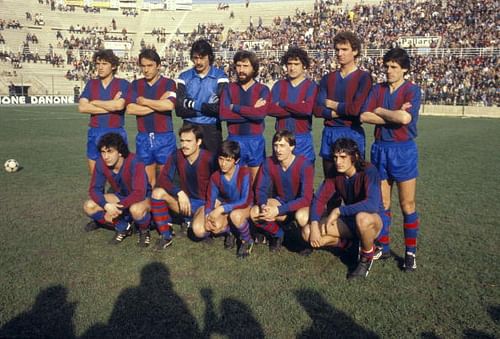
Johan Cruyff's Paradox: Is Tiki-taka Simple or Complex?
↵

"Playing football is very simple, but playing simple football is the hardest thing there is." – Johan Cruyff
"To make something look simple, you have to master the complex." I would say that this quote (I made it up) goes a long way towards explaining the philosophical reasoning behind the way that Barcelona play football. It has always fascinated me how many observers make the conclusion that their style of play, and the reason that it's successful, is very simple, done very well. In my mind and in my experience with observing and studying Barcelona I cannot comprehend how people can come to that particular conclusion.
A team which has revolutionised modern football since I started to follow the sport and that have broken so many boundaries of what was considered as the traditional norm surely does not play a simple brand of football. How can it achieve so much by playing so simply? Or perhaps there is more to this than first viewed. The man who can potentially answer this question is a legend of the game, or more appropriately, a legend of Barcelona - Johan Cruyff.
Perhaps Pele and Maradona can lay claim to being better players than Cruyff, but Cruyff has arguably had a bigger impact on the game itself. None more so than at Barcelona whom he played and coached, but more importantly, changed the whole philosophy and structure of the club. The most important idea he introduced was a concept of ball orientated football - to keep the ball when you have it and get it back quickly when you don't.
Cruyff often speaks about simplicity - to play with excess contradicts what passing was supposed to achieve - simplicity. Cruyff once criticised a goal that was scored because he claimed that the goal should have been scored earlier in the play. The extra passes were unnecessary and increased the chances that a mistake would happen. Simplicity increases efficiency and effectiveness. Think of Arsenal and how many times they overelaborate a goalscoring opportunity. According to Cruyff, a team should take a shot on goal at the earliest possible opportunity in order to increase the chances of scoring. To Cruyff, the perfect goal would be one which is scored with minimal effort, no unnecessary risks taken, and maximum efficiency.
"To play well, you need good players, but a good player almost always has the problem of a lack of efficiency. He always wants to do things prettier than strictly necessary."
Simplicity is an intangible concept which is falsely described by numbers and statistics. It is a concept invented by the human mind and is a quality which is vary hard to explain, much like creativity. However one defines simplicity, it ultimately reflects our perception of if it and more importantly, our understanding. To a physicist, the laws of physics make perfect sense because it follows certain laws. To a less learned person, it would make no sense whatsoever. The two different perspectives doesn't change the reality. The laws of physics is what it is. It remains the same no matter how we think of it. In applying this to football, Barca's football is what it is. It is the constant. The audience is the variable.
This is why it is hard to definitively judge the complexity of Barca's style of play. To some it is an intricate web of movements and chain reactions - a systems version of football that is reliant upon every sub-system to function in order to make the whole system work and flourish. To others, tactics and details are overstated and that specific choreography has nothing to do with their style - it is the talent of the players and the way they simply pass the ball to the nearest team mate until someone can take advantage of an opposition defensive error.
I wrote an article stating that your opinion of what makes an entertaining game depends on three things: your knowledge of the game, the reason you are watching, and your expectation of the game. I believe that these three things also shape your view of the simplicity of Barca's football. In a way, your personal philosophy shapes the way you view football. You don't need to be a coach to have a philosophy, your philosophy is simply an aggregate of your past experiences and your personality. This goes some way towards explaining why some people would describe Barca's football as complex, and other people, simple.
When Cruyff speaks about football he often speaks about the entertainment value of the game, that there is more to it than winning. He believes in a certain style of play which has the power to put a smile on the people's faces as he described it. As such, he was a believer in his own philosophy, of a beautiful way of playing:
"It's better to go down with your own vision than with someone else's."
He would rather lose playing good football than winning playing ugly football. He said of the 1974 world cup final against West Germany that losing that final made the Netherlands more famous than it otherwise would have. To say that it was better to lose than to win because it left a better legacy speaks volumes about the mindset of Cruyff - quite romantic and idealist. It is therefore quite mysterious why Cruyff often speaks quite pragmatically. In a video on Dutch television Cruyff said that he never likes playing with two men in midfield because they could get exposed too easily. Instead, he always plays with three in midfield, explaining that "I am much more defensive than people think." Following on from this admission of pragmatism, he quoted this famous line:

"If you can't win, make sure you don't lose.”
This evidence contradicts the common stereotype that Cruyff is the ultimate priest of tiki-taka and total football hell bent on entertaining the masses. He clearly does not like losing but he won't settle for playing a rugged and prehistoric style of football. This paradox in mentality is reflected on the pitch.
The concept that simplicity is the best form of playing football is all well and fine - it makes sense, certainly on a theoretical level. Put in practice however, it's a different story. Stoke City play with simplicity in theory because they do not overelaborate their build up play from the back. Compared to most Champions League teams, they play the most direct football because of their comparatively aerial style. Overall, it can be said that Stoke City play with simplicity. On the other hand, Barcelona have an opposite style of play compared to Stoke - a more indirect and slower buildup from back to front. It involves a greater amount of passes and more patience. What does this mean - is it an indication that Barca do not play simply enough?
Take the example from the most recent Clasico game in the league at the Bernabeu. At one stage of the match, Messi and Iniesta exchanged several passes between them in the absence of any defensive pressure from the Madrid midfield players. It got them nowhere and it achieved nothing - no progression and no objective accomplished. It was a display in excess and indulgence - we can pass the ball all day, you see! It was like a scene straight from The Simpsons. It was akin of the analogy of the Arab sheikh living within his enormous mansion; living in it for show and prestige, but not for practicality. Has Barca become the Arab sheikh in a way?
It seems as though tiki-taka has outgrown its initial purpose - to control the game with minimal effort and exertion. It's as if the club has become so entrenched in this way of playing to the point that passing has outgrown its existence as merely a mechanism to win football matches. It has instead become the objective itself, to keep the ball. In this case, possession is no longer merely a means to an end - but the end in itself. In this context, tiki-taka possession football is no longer useful for Cruyff.
"Every solution to every problem is simple. It's the distance between the two where the mystery lies." – Derek Landy.
The system is one thing but the players who play within it can corrupt the theory behind it. The 4-3-3 system is one that was designed to give maximum options to any player in possession of the ball. In this way it is saying to the players When you have the ball, pass it to the nearest team mate and then move. Keep it simple - pass and move, pass and move. In theory, the 4-3-3 optimises spacing of players in order to help the players follow the short passing philosophy. In practice, the players became masters of this style after many years learning it in the academy. Over time, merely passing the ball in order to create chances to score goals became pointless in a way.
It became too easy. If we can keep the ball, why must we give it away so easily. The concept of passing started as an idea to score goals but it has since morphed into a total theory of football - of attack, defence and control. The cause of this metamorphosis is the talent of the current generation of players. No other team are as adept at rondos than Barcelona. No other team has the best player in the world of the last four years. How can a philosophy of simplicity be justified when simplicity is the enemy of extraordinary minds? Messi's skills are too elaborate for such a dimwitted system of play and Xavi, Iniesta and Busquets are too smart. It is in fact the very simplicity of the system that has allowed the foundation for layers of complexity to be added.
What started as simply another way of playing the game has grown and grown. Today it has become the philosophy of a whole club and is becoming it in many others. Who would have thought that the arrival of Cruyff to Barcelona as a player would mark the beginning of something special. The supporters saw a glimpse of a whole team in one player. Years later, that one man gave his insight to a whole team. The reason why Cruyff has been such an influential and celebrated figure in the game was that he was different. He gave the world something new and unique. No matter your opinion of the actual style of play, it is undeniable that it has left a legacy to football.
"Simplicity is the ultimate sophistication." – Leonardo da Vinci